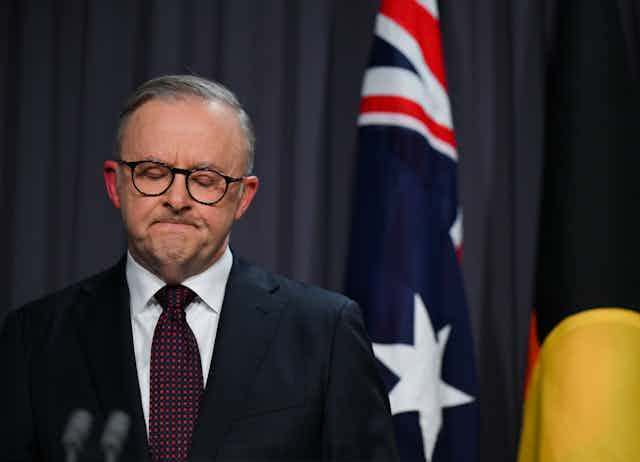A national Newspoll, conducted October 30 to November 3 from a sample of 1,220 people, gave Labor a 52–48% lead over the Coalition, a two-point gain for the Coalition since the final Newspoll before the October 14 Voice referendum. This is Labor’s narrowest lead in Newspoll since the 2022 federal election.
Primary votes were 37% Coalition (up two percentage points), 35% Labor (down one), 12% Greens (steady), 6% One Nation (steady) and 10% for all others (down one).
Prime Minister Anthony Albanese’s ratings were 52% dissatisfied (up six points) and 42% satisfied (down four), for a net approval of -10, down ten points. This is easily his lowest net approval in Newspoll since becoming PM. This graph shows the continued decline in Albanese’s Newspoll ratings since late 2022.

Opposition Leader Peter Dutton’s net approval improved five points to -13. Albanese’s lead over Dutton for preferred prime minister narrowed to 46–36%, from 51–31% previously. This is also Albanese’s smallest lead since the election. Newspoll and Redbridge figures are from The Poll Bludger.
The slumping polls show how damaging the heavy defeat of the Voice referendum and continuing cost of living pressures have been to Albanese and Labor.
Redbridge national poll: Labor’s lead holds steady
The Herald Sun reported Sunday that a Redbridge national poll, conducted October 25 to November 2 from a sample of 1,205 people, gave Labor a 53.5–46.5% lead over the Coalition, a 0.6-point gain for the Coalition since early September.
Primary votes were 35% Coalition (down one point), 34% Labor (down three), 14% Greens (up one) and 17% for all others (up three).
The Herald Sun emphasised large primary vote swings against Labor among those with lower educational attainment, but these would be based on small subsamples of the overall sample, and are thus not reliable.
Voice referendum final results
All of the votes in the October 14 referendum on an Indigenous Voice to Parliament have now been counted and the final results are in.
Nationally, “no” won the referendum by a 60.06–39.94% margin, or 20.1 points. “No” also won every state, by 8.3 percentage points in Victoria, 17.9 points in New South Wales and Tasmania, 26.5 points in Western Australia, 28.3 points in South Australia and 36.4 points in Queensland.
For the referendum to be successful, it needed a majority in at least four of the six states, as well as a national majority. The territories are counted towards the national total, but not the majority of states. The “no” vote won in the Northern Territory by 20.6 percentage points, while “yes” came out ahead in the ACT by 22.6 points.
Nationally, 34 of the 151 House of Representatives electorates voted “yes” while 117 voted “no”. In NSW, 11 of 47 seats voted “yes”, in Victoria 13 of 39, in Queensland three of 30, in WA two of 15, in SA none of ten, in Tasmania two of five, in the ACT all three seats and in the NT none of two.
All seven seats won by “teal” independents and all four won by Greens at the 2022 election voted “yes”, as did 21 of the 78 Labor-held seats. Bradfield in NSW was the only one of 57 Coalition-held seats to vote “yes”.
ABC election analyst Antony Green has a chart showing the “yes” and “no” split by vote type. Pre-poll ordinary votes were far worse for “yes” than polling day ordinary votes, and postals were even worse. But both polling day absent votes and declaration pre-poll votes were better for the “yes” side than polling day ordinary votes.
Turnout for the referendum was 89.9%, higher than the 89.8% turnout recorded for the House at the last federal election.
How did the polls do?
The graph below shows the “yes” lead or deficit in all polls conducted this year, culminating with the final result (“no” by 20.1 points). Newspoll’s final poll was the most accurate, showing a 20-point “no” lead. YouGov’s final poll had an 18-point “no” lead, while Focaldata’s poll suggested a 22-point defeat.

Other pollsters did not perform as well, such as Morgan, whose final poll showed “no” with just a seven-point lead, and Essential, which had given “no” a six-point lead. Essential has altered its methodology since the referendum to weight results by education level.
Newspoll’s state breakdowns were also good at the state level, with the exception of WA. “No” led in the final Newspoll by 13 points in NSW, eight points in Victoria, 35 points in Queensland, 27 points in SA, 37 points in WA and 17 points in Tasmania.
The Resolve poll had “yes” ahead in Tasmania by 56–44% in its final poll, which was a large error given “no” won in the state by almost 18 points.
Newspoll was administered by YouGov until mid-July, but is now managed by Pyxis. Both the new Newspoll and YouGov performed well.
Victorian Mulgrave byelection
A byelection will occur on November 18 in the Victorian state seat of Mulgrave, previously held by former Labor Premier Daniel Andrews. At the 2022 state election, Andrews defeated independent Ian Cook after preferences by 60.8–39.2%, and the Liberals by 60.2–39.8%.
Cook is running for the seat again. He will face nine other candidates, including Labor’s Eden Foster and the Liberals’ Courtney Mann.
Argentine legislative results
I covered the Argentine legislative results from the October 22 election in my article for The Poll Bludger. The combined right-wing parties won control of the lower house in Argentina, but failed in the Senate owing to a system similar to first-past-the-post.

